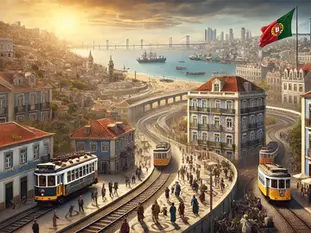Exploring the Rich Culture of Angola and Portugal

Angola in Poetry: Verses of a Nation in Struggle and Hope
3
3
0
By João Elmiro da Rocha Chaves
The history of Angola is a vibrant narrative of resilience and hope, woven by the hands of a people who, for forty-one years, faced indescribable challenges in the pursuit of a sovereign destiny. In 1975, on the brink of independence, the sentiment in the streets, in homes, and in the hearts of Angolans was one of a deep longing for freedom, although tinged with uncertainty.
However, independence brought with it the continuation of the Cold War, whose global forces intertwined on Angolan soil, deepening divisions and prolonging suffering. The ideals and hopes of our nation were shaped—and often constrained—by foreign interests that saw Angola as a strategic battleground. This era left deep marks, influencing our trajectory as a people and strengthening our spirit of struggle and resilience.
Today, I present three poems written in the diaspora after the Cold War ended in 1992, an era of profound transformation: "Angola," "The Bomb," and "My Land." These verses capture the spirit of an Angola both lived and felt in its most intense and delicate facets—a land that, despite everything, keeps alive the flame of its own identity.
Angola: A Cry for Unity and Hope
In the poem "Angola," the verses reveal a vibrant country, beloved and coveted, yet unyielding in the face of imperialist interests. Like a hymn of unity, the poem echoes the collective cry of a people seeking freedom. Here, Angola is not just a nation; it is a “land of unmatched grace” that, through its history of blood and sweat, stands firmly on a pedestal of dignity. The poem captures the nation’s essence and immortalizes the dream of independence.
ANGOLA
Oh, Angola, land of grace and pride,
Coveted by those with greed as their guide.
Your fertile soil, a treasure bright,
With blood and sweat, it tells our plight.
For forty-one years, our people rose,
In battles fierce, their fate they chose.
Their sacrifice, a noble stand,
To free the soul of our beloved land.
Oh, land of love, with freedom near,
Bearing trials and truths sincere.
May all who see you understand
The grace of Angola, so proud and grand.
Angola, Angola, our song and cry,
For justice, freedom, to reach the sky.
Oh, Angola, hearts take flight,
In the promise of independence bright.
This poem becomes a manifesto of identity, a testimony to the strength and pride of being Angolan. It is a song of love and promise, where the beloved homeland remains a beacon for future generations in their quest for a free and sovereign future.
The Bomb: The Fear and Reality of War
"The Bomb" reveals the dark and unsettling side of conflict, where the terror of an imminent explosion and the uncertainty of survival haunted everyone’s thoughts. The verses speak of the constant fear of a "cruel bomb," with an unrelenting fate, threatening lives and dreams with brutal inescapability.
In this poem, we plunge into the raw reality of war, where people are forced to flee, leaving behind everything that once brought them joy.
THE BOMB
The cruel bomb with fate set high,
My life at risk beneath the sky.
What path to choose, where can I flee,
Beneath death’s shadow haunting me?
The bomb unkind, with destiny near,
My cries for mercy fade in fear.
Oh, my country, where can I run,
Leaving all that brought me sun?
And comrades flee along my side,
Seeking shelter far and wide.
And those who stayed, their fate foregone,
In war’s dark grasp, their souls are drawn.
Each verse in this poem strikes at the heart of war, exposing the terror and desolation faced by those who lived under the shadow of death. The anguish of fleeing and despair for comrades left behind paints a powerful image of a wounded yet resilient Angola.
My Land: A Lament and a Prayer
Finally, in "My Land," we find a deep lament for an Angola that suffers and resists, stifled by greed. The poem expresses the pain of seeing its soil stained with blood, as well as the desire for peace—a plea for the fury of war to subside, allowing the land’s purity to be restored.
Amid the chaos, there is a heartfelt prayer that the monstrous destruction will leave no trace, so that Angola may one day live without oppression’s weight.
MY LAND
Oh, dearest land, your beauty rare,
Yet marred by greed beyond compare.
In your fertile earth, blood flows deep,
A silent cry, a wound that keeps.
With tearful eyes, we watch your fate,
As peace slips by, and hope grows late.
Forced to leave your warm embrace,
Seeking comfort in a dark place.
Oh, monstrous power with gleaming teeth,
Devouring innocence beneath.
Temper your rage, let peace descend,
Restore the life war dared to end.
"My Land" is a prayer for redemption, a cry that echoes the longing for Angola’s peace. At the same time, it is a denunciation of foreign greed and the destruction it brings, a plea for a future where Angola can flourish in peace and freedom.
Reflection and Relevance Today
These poems are more than simple verses; they are living testimonies of a time when Angola prepared to reinvent itself as an independent nation. For the Portuguese reader, they offer a glimpse into the anguish, love, and hope that pulsed within Angolan hearts.
Through this poetic language, which is simultaneously beautiful and painful, we are invited to feel the Angolan experience, to recognize its struggle, and to respect its journey.
These verses not only capture the essence of a historic moment but also perpetuate an eternal love for Angola. May these words resonate, echoing in the hearts of all who read them, and remind us that even in the most difficult circumstances, the hope for freedom and justice remains unbreakable.







